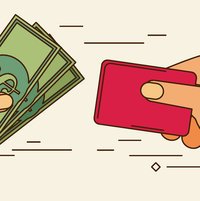Credit Card Debt Calculator
Credit card interest can add up quickly. Use our calculator below to figure out exactly how long it will take you to pay off your cards and how much money you'll end up paying in interest.
Just fill out Total Monthly Payment or Months Until Paid Off and we'll calculate the other for you.
If you can make monthly payments of $ , you'll pay off all your credit card debt in months . In total, you will have paid $ , of which $ will have been interest.
About This Calculation
This calculation assumes interest accrues monthly. Your last payment will be the remaining balance, and will generally be less than the 'Total Monthly Payment' you entered. We assume your first payment will be one month from today and interest only accrues on the balance not paid at that time. This calculation should be used for informational purposes only.
About Credit Card Debt
Roughly 1 in 3 Americans carry some amount of credit card debt. Those that are in debt find themselves owing upwards of $15,000 on average. To make matters worse, average real wages have more or less stagnated for quite some time, with the average american household income in 2016 just slightly above $50,000. That’s makes credit card debt around 30% of pre-tax income for a striking number of Americans.
What You Can Do
Balance Transfers
First of all, remember that credit card companies make a great deal of their money from interest payments on debt. Average credit card interest rates tend to hover around 15%, with large discrepancies between different cards. Part of the interest rate they charge offsets their risk that you default and they’re stuck with the entire bill, and part of it is profit. If you think you’re being charged a high interest rate, especially relative to your credit rating, there’s a good chance you’ll be able to roll over at least a significant portion of your debt to a lower interest credit card. Even if your new card makes less of a profit off you, that’s profit it didn’t have at all before. In fact, if you have decent credit, many cards offer low or 0% introductory rates just to get your business. If you have $15,000 on a card charging you 15% a year in interest and you’re able to save yourself a whole year of that interest, that’s an extra $2,250 that you didn’t have before.
Debt Consolidation
Debt consolidation is similar in principle to a balance transfer, but it involves tackling all your debt at once. If you have credit card debt, there’s a good chance you’ve got other debt too, such as student loans, a car loan, etc. With debt consolidation, you may be able to roll all or many of those loans into one loan with a lower interest rate. Just be careful to make sure you’re getting a better deal on your consolidated loan than you were on the individual loans.
Negotiation
This one isn’t easy, but it is sometimes possible to negotiate away some of your debt if you can convince your credit card company or companies that you’re not able to ever pay them in full and it’s in their best interests to give you a lower balance or lower interest rate in exchange for your commitment to make regular payments on the debt. From their perspective, getting some of the money back is better than not getting any of it. Settling your debt may get debt collectors off your back, but it could also harm your credit score. Be sure to do your homework before you start down this path.
Bankruptcy
This is a last resort for most people. Filing for bankruptcy will hurt your credit score and you can only file at most once every 8 years. In addition, the 2005 Bankruptcy Abuse Prevention and Consumer Protection Act made it harder to file for the often more favorable Chapter 7, especially for people whose income exceeds the median of their state. If you’re not able to file under Chapter 7, you may be able to file under Chapter 13, which was designed to allow you to reorganize your debts and generally involves a plan to pay back some of what you owe.
Top Articles

8 Reasons Why Credit Cards are Better than Cash

8 Individual Tax Breaks You Might Not Know About

8 Things That Can Affect Your Mortgage Rate

Homeownership as an Investment

Main Types of Investment Assets

Investing for Retirement

Is Marriage Good for Taxes?

A Brief History of Credit Cards